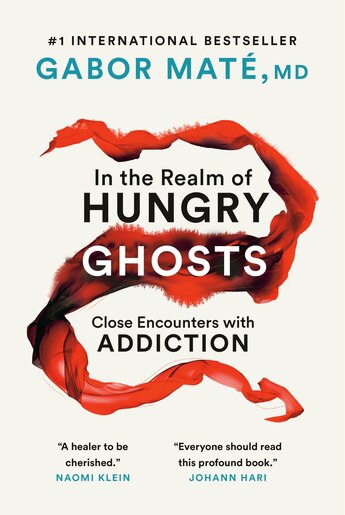
I can’t for the life of me remember how Dr Gabor Maté’s In the Realm of Hungry Ghosts: Close Encounters with Addiction ended up on my To Read list. This fascinating treatise on the many facets of addiction from brain chemistry to early childhood experience was an excellent read but not always an easy one. Maté is a doctor in Vancouver’s Downtown Eastside, where the non-profit Portland Hotel Society provides a “hard-to-house” population of drug addicts and those with serious mental health issues with a place to live and medical and social care. This book weaves stories and anecdotes from Maté’s practice there with scientific research, case studies and his own perspective on the issue of addiction to create something that is incredibly nuanced and complex.
Maté tackles the War on Drugs, exploring its irrefutable failures and their catastrophic consequences, both for the ostracised addicts under siege and society as a whole. He delves deep into the issue of childhood trauma, documenting both the heartbreaking personal stories he has encountered in his practice and the research about what trauma and neglect in early childhood do to the human brain and how this fosters a predisposition to addiction. He considers how modern industrial society with its dislocated families and breakdown in traditional social structures contributes to the West’s current crisis of addiction. He also reviews government and policing policy regarding addiction both in his home country of Canada and in the wider world and he takes in the spiritual and holistic framework that may offer another way of looking at drug addiction.
There is so much insight in this book for anyone interested in addiction, whether on a personal or professional level – or even if you are just a curious reader looking to better understand part of the human condition. Those reading this book primarily from a social perspective (like me) can hopefully get a lot out of the incredible wealth of scientific research Maté has broken down in a clear, accessible manner (that’s not to say I didn’t struggle on tired days with certain portions of the book, or have to reread the odd passage!). You can tell Maté is passionate about helping addicts and effecting real change and all the research he explores is filtered through that perspective – there are no dry, fusty studies for the sake of studies here. Some of the animal research he discusses, however, does make for uncomfortable reading.
Those coming at this book from a purely medical or scientific angle may, at the other end of the scale, benefit from the very personal, human stories contained in this book – Maté tells these with great compassion yet without sentimentality. There are no great film-worthy triumphs over addiction here and, strikingly, Maté would like society to promote harm reduction policies that accept that, for some, abstinence is not a realistic option, at least for the foreseeable future. That’s actually quite radical and powerful, I think – this idea of meeting people where they genuinely are, and caring about their treatment even if the end result isn’t the outcome we would ideally like to see.
All in all, this book is a powerful and comprehensive study of addiction. I finished it with a sense of relief as some of it felt grim and unrelenting, but I respect that Maté doesn’t shy away from the reality that his patients and others like them truly face. There were moments in this book that made me feel absolute despair for the future and traumatic stories that I will struggle to forget that genuinely gave me nightmares – but I was also left with a sense that much is possible for the addicted person and the addicted brain, that there is another way forward for societies rife with addiction and the myriad issues that arise from that. There are no quick fixes, Maté is clear on that, but with greater knowledge comes greater understanding, from greater understanding comes greater compassion – both for ourselves and for others – and, from that, real, enduring change could grow.

